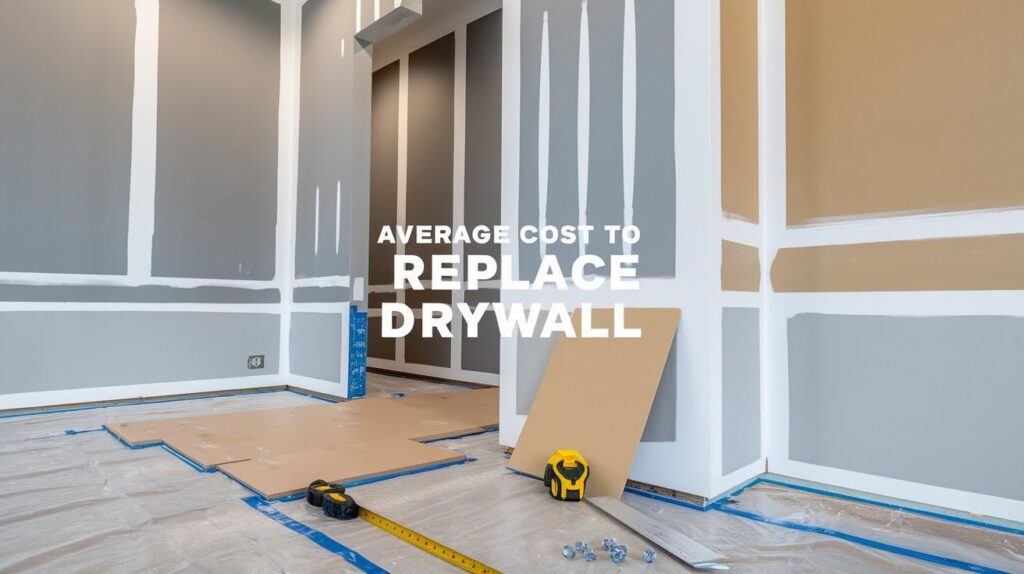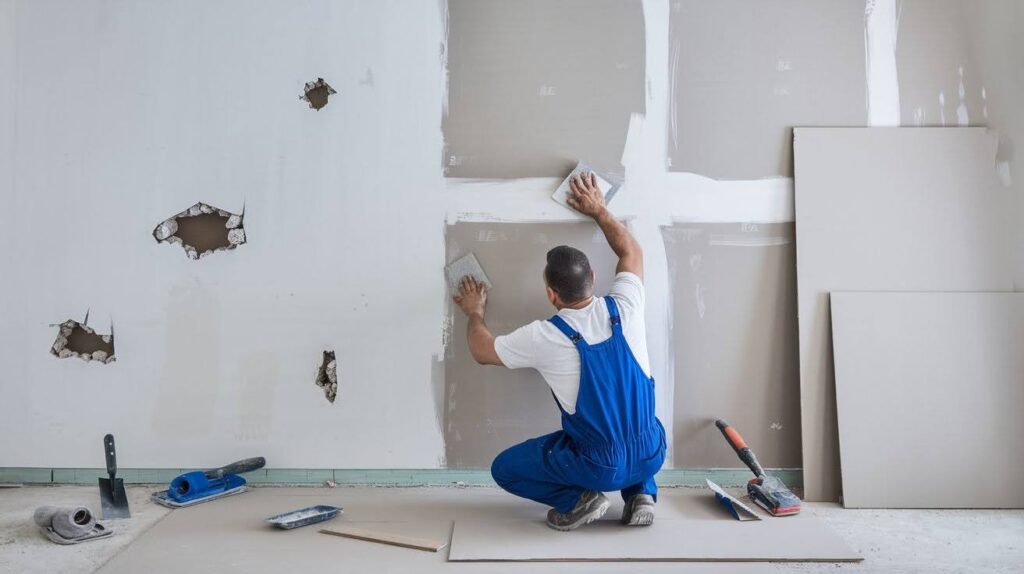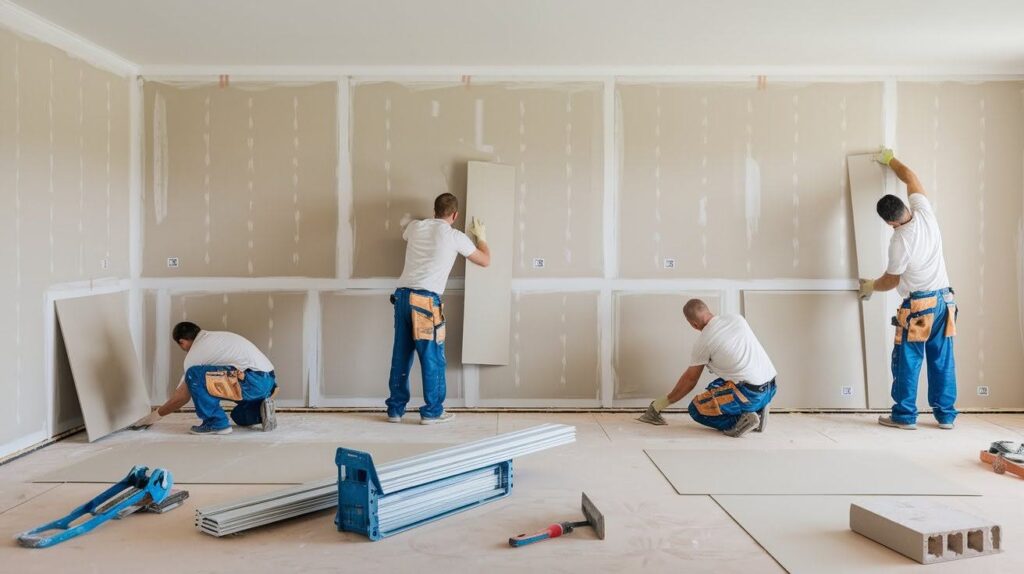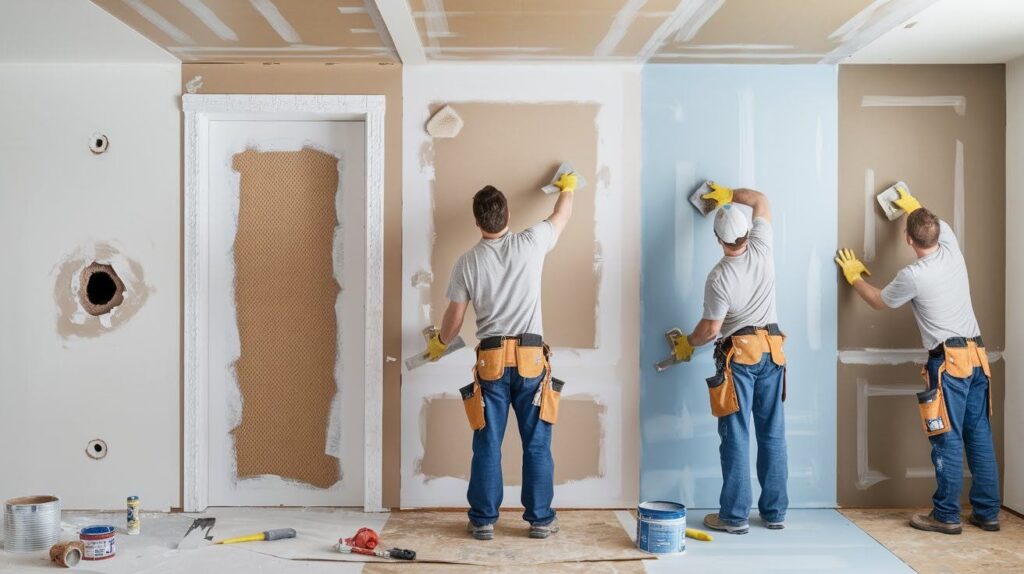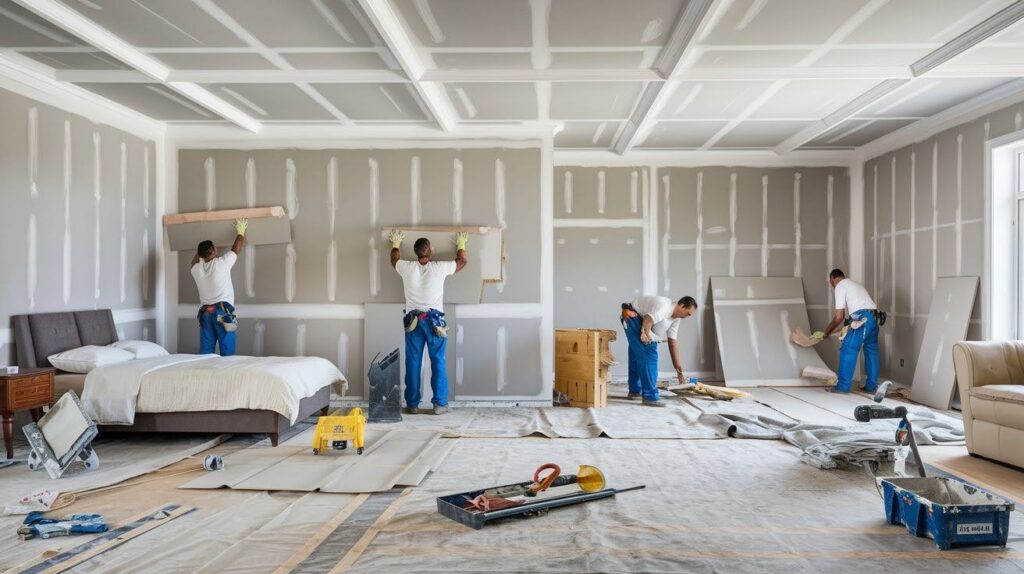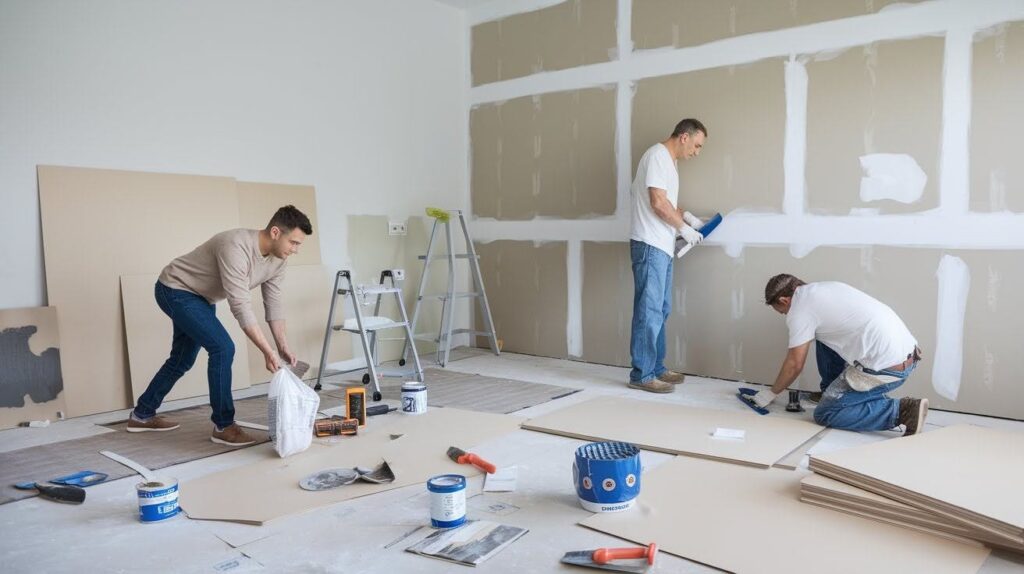When your walls start showing their age, whether it’s due to water damage, holes, or simply years of wear, you’re probably wondering how much it’ll cost to fix or replace the drywal. Nobody wants to call a contractor without having some idea of what they’re looking at in terms of price.
I’ve helped hundreds of homeowners figure out their drywall costs, and I know exactly what questions you have. In this article, I’ll break down the real numbers you can expect for replacement projects. You’ll get straight answers about labor costs, material prices, and what factors bump up your total bill.
By the time you finish reading, you’ll know enough to budget properly and avoid getting caught off guard. No surprises, no inflated estimates, just honest information you can trust to make the right decision for your home.
How Much Does Drywall Repair Cost?
Most drywall repairs range from $75 to $400, depending on the size and complexity of the damage. Let me share the actual numbers I see every day in the field.
Small holes (nail holes, small dents) cost between $75 to $150. These are the easy fixes. I can usually knock these out in under an hour.
Here’s where it gets tricky, though:
Medium holes (doorknob damage, larger dents) run $150 to $250. These need a bit more work and materials. You’re looking at patching compound, sanding, and matching the texture.
Large holes (fist-sized or bigger) cost $250 to $400. These require cutting out damaged sections and installing new drywall pieces. It’s mini-replacement work.
The biggest factor in your final bill? Labor costs in your area. I’ve seen the same repair job cost $100 in rural areas and $300 in major cities.
Here’s what most contractors charge:
- Small repairs: $75-150
- Medium repairs: $150-250
- Large repairs: $250-400
Pro tip: If you have multiple small holes, many contractors will give you a better per-hole rate. Always ask about bundling repairs together.
Cost To Replace Drywall
Complete drywall replacement typically costs $1.50 to $3.50 per square foot, including materials and labor.
I’ll break this down room by room so you know what you’re really facing:
Small room (10×10 feet) runs $600 to $1,400 total. That includes tearing out the old stuff, hanging new sheets, and finishing everything properly.
But here’s the thing.
Medium room (12×14 feet) costs $1,200 to $2,800. The square footage jumps fast when rooms get bigger.
Large room (16×20 feet) hits $2,400 to $5,600. These bigger spaces eat up materials quickly.
Now, whole house replacement? I typically see $8,000 to $25,000 for average-sized homes.
The material costs alone run about $0.50 to $1.00 per square foot. Standard 1/2-inch drywall sheets cost around $15 each at most suppliers.
Labor makes up the big chunk though. Experienced crews charge $1.00 to $2.50 per square foot just for installation and finishing.
Here’s your typical breakdown:
- Removal: $0.25-0.50 per sq ft
- New drywall: $0.50-1.00 per sq ft
- Labor: $1.00-2.50 per sq ft
Factors That Affect The Cost Of Drywall Repair
Several key variables can double or triple your repair costs, from damage size to your home’s location.
Drywall Repair Materials
The materials you need depend entirely on what’s broken. Basic nail holes only require spackle and sandpaper. That’s maybe $10 in supplies.
Larger holes need drywall patches, joint compound, and primer. You’re looking at $25 to $50 in materials.
But here’s where costs climb:
Major damage requires full drywall sheets, screws, tape, and multiple coats of compound. Material costs hit $75 to $150 easily.
Specialty materials cost more, too. Moisture-resistant drywall runs 20% higher than standard sheets. Fire-rated drywall costs even more.
The texture-matching materials often surprise people. Orange peel texture spray costs $15 per can. Knockdown texture needs special tools that rental shops charge $30 daily for.
Drywall Repair Cost Per Square Foot
Small patch repairs run $3 to $5 per square foot. This covers patches smaller than 6 inches.
Medium repairs cost $5 to $8 per square foot. Think doorknob holes or water damage spots.
Major section replacement hits $8 to $12 per square foot. This involves cutting out entire damaged areas and installing new drywall pieces.
Ceiling repairs always cost more. Add 25% to any wall price when you’re working overhead.
Drywall Repair Cost By Type Of Solution
Nail hole filling costs $2 to $5 per hole. Quick spackle job, sand, prime, and paint.
Mesh patch repairs run $25 to $75. These work for holes up to 4 inches wide.
Cut-and-patch repairs cost $75 to $200. You’re cutting out damaged sections and installing new drywall.
Here’s the expensive one.
Full panel replacement hits $150 to $400 per panel. This means removing entire 4×8 sheets and starting fresh.
Water damage repairs cost the most because they often involve multiple panels. I’ve seen single water damage jobs cost $800 to $2,000.
The finishing work adds significant cost, too. Texture matching and paint can double your material expenses.
Replacement Cost Of Drywall
Full drywall replacement projects range from $1,200 for small rooms to over $25,000 for entire homes.
Let me show you what complete replacement costs in today’s market.
Single room replacement runs $8 to $15 per square foot installed. A typical 12×12 bedroom with 8-foot ceilings needs about 480 square feet of drywall. That’s $3,840 to $7,200 total.
Labor dominates your bill. I charge $2 to $4 per square foot just for hanging and finishing. Experienced crews know how to work fast without cutting corners.
Removal costs add another layer. Tearing out old drywall runs $1 to $2 per square foot. Plus, you’ll pay dump fees for disposal.
Here’s what catches people off guard:
Preparation work can double your timeline. Moving furniture, covering floors, and protecting fixtures takes serious time. Most contractors charge $500 to $1,500 for prep work alone.
Electrical and plumbing issues pop up during removal. I find problems behind walls about 60% of the time. Budget an extra $500 to $2,000 for unexpected repairs.
Ceiling replacement costs more than walls. The overhead work is physically demanding and takes longer. Add 30% to your wall prices for ceiling work.
Whole-house projects get better per-square-foot rates. I’ve done complete homes for $12,000 to $35,000. The volume brings down unit costs.
High-end finishes bump up prices fast. Level 5 smooth finishes cost 40% more than standard texture work.
Regional pricing varies wildly. The same job costs $8,000 in rural areas and $18,000 in major cities.
Here’s your realistic budget range:
- Small room: $1,200-3,500
- Large room: $2,500-6,000
- Whole house: $12,000-35,000
How To Save Money On Drywall Repair
Smart homeowners can cut drywall repair costs by 30-50% with the right approach and timing.
Here’s what you should do:
Do the prep work yourself. Moving furniture and covering floors saves you $200 to $500 right off the bat. Contractors charge $50 per hour for this basic stuff.
Buy your own materials. I mark up supplies by 20-30% to cover my time shopping. You can buy directly from home centers and save that markup.
Bundle multiple repairs together. People give serious discounts when you have several holes to fix. The minimum service call is $150, so combining jobs makes sense for everyone.
Time your project right. Winter months are slower for contractors. People often discount jobs by 15-20% during January and February.
Get multiple quotes. Prices vary wildly between contractors. I’ve seen the same job quoted at $300 by one guy and $800 by another.
Here’s what most people miss:
Skip the texture matching if you’re repainting the whole room anyway. Smooth finish costs less and looks great with the right paint.
Handle small holes yourself. Nail holes and tiny dents are easy DIY fixes. A $15 repair kit handles most minor damage.
Choose standard materials. Specialty drywall costs 50% more than regular sheets. Standard 1/2-inch works fine for most repairs.
Ask about leftover materials. Contractors often have partial sheets from other jobs. I sell these at half price rather than haul them back to the shop.
Negotiate payment terms. Some contractors offer 5-10% discounts for cash payments. It saves them credit card fees.
Your biggest savings come from realistic planning. Don’t rush into emergency repairs. Take time to get proper quotes and make smart material choices.
Money-Saving Tips For Drywall Repair
- Do your own prep work – Move furniture and cover floors yourself to save $200-500
- Buy materials directly – Skip contractor markups of 20-30% by shopping at home centers
- Bundle multiple repairs – Combine several jobs to get better per-repair pricing
- Schedule during winter – January and February often bring 15-20% discounts
- Get 3-5 quotes minimum – Prices can vary by hundreds of dollars between contractors
- Skip texture matching – Choose smooth finish if you’re repainting the entire room
- Handle small holes yourself – Use $15 repair kits for nail holes and minor dents
- Use standard materials – Regular 1/2-inch drywall costs 50% less than specialty types
- Ask about leftover materials – Contractors often sell partial sheets at half price
- Pay with cash – Some contractors offer 5-10% discounts for cash payments
- Plan ahead – Avoid emergency pricing by getting proper quotes in advance
- Consider off-peak timing – Contractors are more flexible with pricing during slow periods
Conclusion
Now you have the real numbers for drywall repair and replacement costs. Small repairs typically run $75-400, while full room replacements cost $1,200-6,000 depending on size and complexity.
Remember the key factors that drive up costs: damage size, material type, labor rates in your area, and project timing. Location makes a huge difference – the same job costs twice as much in big cities compared to rural areas.
My best advice? Get multiple quotes, bundle repairs together, and don’t rush into emergency fixes. Do your prep work yourself and buy materials direct when possible. These simple steps can cut your total bill by 30-50%.
Budget smart, plan ahead, and your drywall project will go smoothly without breaking the bank.
Frequently Asked Questions
How Much Does It Cost To Fix A Small Hole In Drywall?
Small holes like nail holes or minor dents typically cost $75-150 to repair professionally. If you do it yourself, a basic repair kit costs around $15 and takes about an hour to complete.
Is It Cheaper To Repair Or Replace Damaged Drywall?
Repair is almost always cheaper for isolated damage under 12 inches. However, if you have multiple holes or widespread water damage affecting large areas, replacement becomes more cost-effective.
How Long Does Drywall Repair Take?
Small repairs take 2-4 hours including drying time for compound. Large repairs or replacements can take 1-3 days depending on the scope and whether multiple coats are needed.
Can I Do Drywall Repair Myself?
Yes, small holes and minor damage are perfect DIY projects with basic tools. However, large repairs requiring texture matching or structural work are best left to professionals for quality results.
What Factors Make Drywall Repair More Expensive?
Location, damage size, ceiling work, and specialty materials drive up costs. Water damage repairs cost the most because they often involve multiple panels and potential mold remediation.

